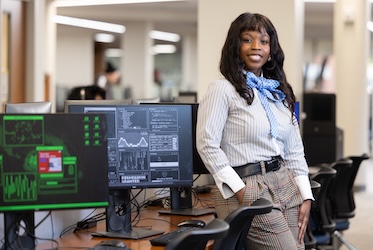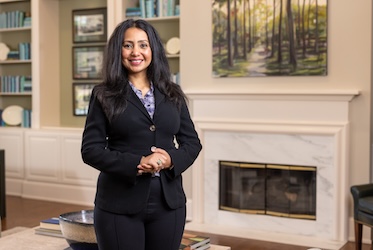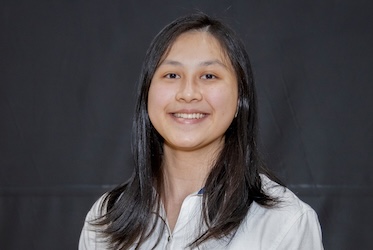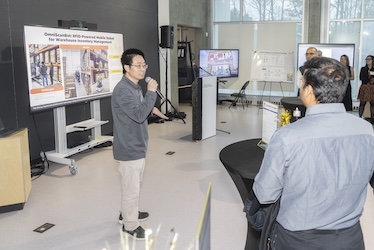
Decentralized Science Lab launches cutting-edge computing research
KENNESAW, Ga. | Jul 8, 2020
Recently, Kennesaw State University assistant professor Reza Parizi came across an email from a former student in his inbox.
Now a graduate student at the University of Georgia, Gianni Orlando thanked Parizi for allowing him to conduct research in the Kennesaw State’s Decentralized Science Lab (DSL), where he performed AI related research alongside faculty experts.
“If it wasn’t for the work I conducted in the DSL, I wouldn’t be where I am today,” he said.

Like Orlando, there are more than a dozen students each semester who conduct research in the lab under the guidance of computer science and software engineering faculty in KSU’s College of Computing and Software Engineering. The lab, founded in 2018 by Parizi, is responsible for cutting-edge research into decentralized computing concepts and their enabling technologies to provide cybersecurity solutions across multidisciplinary domains, such as artificial intelligence (AI), machine learning and internet of things.
“Everything started with Bitcoin,” said Parizi, who teaches in the Department of Software Engineering and Game Design and Development. “The enabling technology behind Bitcoin (known as blockchain technology) is fascinating and revolves around the idea of removing the man in the middle and letting end-users be in charge of handling transactions and data transparently. This unofficially marked the beginning of the decentralization beyond the payment industry, which is now getting traction among researchers.”
One of the driving factors behind decentralization is privacy, he added. By shifting data away from a central authority, end-users can take comfort in knowing their information is kept safe on their end. To achieve this, student research assistants in his lab are hired to conduct research into how machine learning techniques, such as federated learning, can be used across many industries. Federated learning is a new machine learning framework that trains an algorithm across multiple end-user devices or servers holding local data samples, without exchanging their data samples. This is contrasts current systems where end-users are required to upload information to a central server or allowing the company to simply capture their data.
“One of the main goals is to preserve the privacy of end users like you and me,” he said. “At the moment, companies are collecting our data, and we don’t know how they will use it or if it is secure. By moving to decentralized systems, we can keep our data safe on our mobile phones and computers.”
For example, he said, one student is researching how federated learning can be used for medical imaging, which is considered a privacy-sensitive field. Rather than have a patient upload private images to a central server on the promise that it will be kept safe, AI on their phones could instead retrain the server to read information that is safely stored on the phone, thus protecting the privacy of the patient.
Another student is exploring how to improve the security of Internet of Things (IoT) networks using federated machine learning approaches for designing more effective Intrusion Detection Systems to prevent cybersecurity attacks.
Decentralization, while still in its infancy, is beginning to gain a lot of traction among leading companies, such as Intel, Facebook and Google, Parizi said. Based on current projections, the transfer of data will only increase in the coming years. Everyday there are 2.5 quintillion bytes of data generated from online purchases and patients’ digital records to emails and social media posts. By 2025, 49 percent of data in the world will be stored in public cloud-based platforms, according to the International Data Corporation.
“The opportunity for students in the DSL is tremendous,” Parizi said. “After conducting research here, they open the door to become data engineers and cybersecurity experts in just about any industry. Here, they are exposed to an advanced level of machine learning they might not otherwise encounter and have the potential to leave their mark in a growing field.”
– Travis Highfield
Photos by Jason Getz
Related Stories

Kennesaw State information technology student, Fulbright semifinalist chasing interest in cybersecurity

Kennesaw State's Healthcare Management and Informatics program celebrates 10 years preparing workforce leaders

Kennesaw State computer science student honored with first President's Award of Distinction

Kennesaw State researcher tackles inventory issues with autonomous warehouse robot
A leader in innovative teaching and learning, Kennesaw State University offers undergraduate, graduate, and doctoral degrees to its more than 47,000 students. Kennesaw State is a member of the University System of Georgia with 11 academic colleges. The university’s vibrant campus culture, diverse population, strong global ties, and entrepreneurial spirit draw students from throughout the country and the world. Kennesaw State is a Carnegie-designated doctoral research institution (R2), placing it among an elite group of only 8 percent of U.S. colleges and universities with an R1 or R2 status. For more information, visit kennesaw.edu.

















